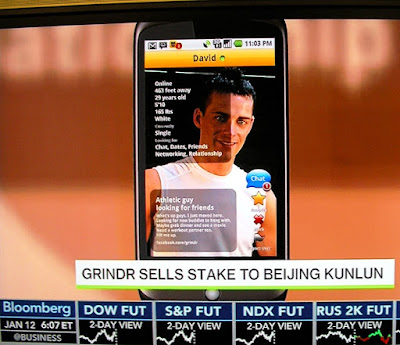PHOTO: The gay dating app GRINDR was shown on screen during the very "straight" San Francisco Silicon Valley cable TV business show "Bloomberg West" (watched live Jan. 12, 2016 3:07PM PT on Bloomberg Corvallis Comcast cable TV channel 743). While photos of cute guys were being shown looking for dates, a financial expert speculated about the reasons behind the related business news story ("Chinese Gaming Billionaire Buys U.S. Gay Dating App GRINDR," bloomberg.com posted Jan. 11, 2016) In his opinion, the biggest reason might have to do more with the fact that Chinese investors are desperately moving money out of the unstable China stock market to anyplace that might be more stable, instead of them moving money to a specific stock pick like the GRINDR stock. I agree, the business demand for sex services is likely to remain strong!
The TV business show "Bloomberg West" is based in the San Francisco Silicon Valley and it has been staffed by reporters who are very knowledgeable about the high technology businesses located there, including the many with a connection to Stanford University, in Palo Alto, such as the granddaddy of Silicon Valley, Hewlett-Packard, and successors, such as Apple Computer and Google. Silicon Valley acquired its nickname from the silicon semiconductor integrated circuit chip businesses that started there, including Intel and others.
One of China's newly minted technology billionaires signed a deal to buy a controlling stake in Grindr, the world's biggest gay social-networking app.
Beijing Kunlun Tech Co., an Internet games company that helped introduce Angry Birds to China, offered $93 million in cash for 60 percent of New Grindr LLC, the company said in a statement to the Shenzhen stock exchange. Beijing Kunlun Chairman Zhou Yahui, who became a billionaire after the company listed shares last year, was scouting other potential investments in the U.S., according to a company spokeswoman, Sophie Chen. . . .
China's attitude toward homosexuality has undergone a radical transformation in the past decade. Once a facet of Chinese culture among the elite, it was pushed underground during the Communist era, and the Chinese Psychiatric Association officially classified homosexuality as a psychiatric disorder until 2001.
Recently, the gay scene has seen a resurgence. Blued, a domestic gay social-networking app founded by a former police officer, has attracted more than 3 million daily users and secured funding from venture capitalists DCM Ventures.
(Quoted from "Chinese Gaming Billionaire Buys U.S. Gay Dating App GRINDR," bloomberg.com posted Jan. 11, 2016)
I've not had a chance to explore the use of GRINDR by OSU students, but I have studied the ethnography of gay male MSM craigslist ads placed by OSU college students, who seem to use it when they are freshman, but then quickly abandon it for some unknown reason (I hypothesize the reason is that they find only a few hookups in the small college town of Corvallis and it becomes easier to cruise boys directly on campus, instead of having to fend off the trolls and weirdos that might harass them on a public dating website or smartphone app. Studying this would make a good research topic for a Master's thesis.)
UPDATE 1/20/16: This gay business story also received a one-sentence report in the printed edition of Businessweek, Jan. 18-24, p. 42, as part of the "Bid/Ask" column. They said, "A Chinese billionaire" paid $93 million for "60 percent of the gay dating app, which boasts 2 million daily visitors in 196 countries." This is a good example of a business that benefits from being able to do business globally on the internet.
See my previous posts:
- OSU back to school Craigslist postings rise (9/16/12)
- Gay relationship ads 1987 vs. 2012 at OSU (3/27/12))
- OSU Valentines Day pride and lonely hearts on Craigslist (2/15/12)
- OSU gay student seeks love on craigslist (5/1/10)
- OSU Craig's List ethnography (5/5/09)
- OSU Craig's List gay romance? (2/21/08)
- OSU Craig's List gay hookups (10/3/07)
